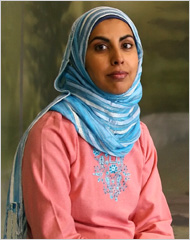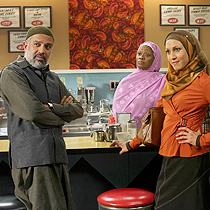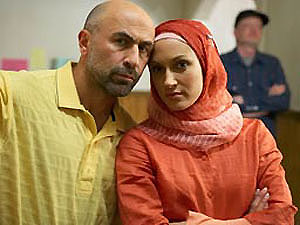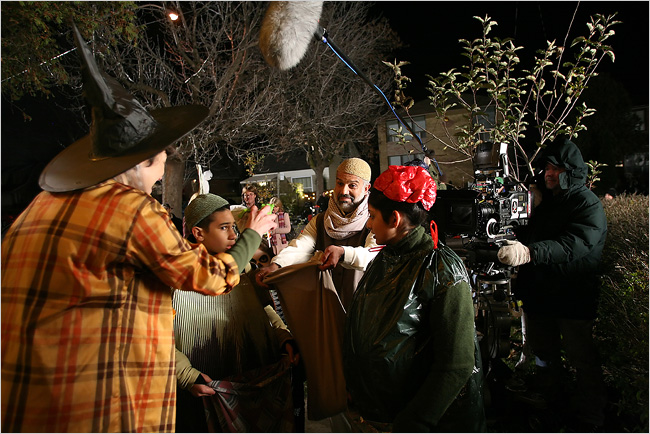|
|
|||||||||||||||||||||||||||||||
|
Little Mosque on the Prairie
Sitcom’s Precarious Premise: Being Muslim Over Here
TORONTO — The handsome, clean-cut young man of evidently Pakistani or Indian origin is standing in an airport line, gesticulating emphatically as he says into his cellphone, “If Dad thinks that’s suicide, so be it,” adding after a pause, “This is Allah’s plan for me.” As might be expected, a cop materializes almost instantly and drags the man off, telling him that his appointment in paradise will have to wait, even though the suicide he is referring to is of the career kind; he’s giving up the law to pursue a more spiritual occupation. The scene unrolls early in the pilot of a new Canadian comedy series called “Little Mosque on the Prairie.” Yet that fictional moment is an all-too-possible occurrence, as witnessed when six imams were hauled off a US Airways plane in Minnesota in November after apparently spooking at least one fellow passenger by murmuring prayers that included the word Allah. “Little Mosque on the Prairie” ventures into new and perhaps treacherous terrain: trying to explore the funny side of being a Muslim and adapting to life in post 9/11 North America. Its creators admit to uneasiness as to whether Canadians and Americans can laugh about the daily travails of those who many consider a looming menace.
“It’s a question we ask ourselves all the time,” said Mary Darling, one of the show’s three executive producers and an American who has lived in Canada for the last decade. “If 9/11 is still too raw, it might not work,” she said. There is the other side of that coin too — what will Muslims think? — which the show’s creators usually summarize in one long sentence that mentions the uproar prompted by Salman Rushdie as well as the Danish cartoons about the Prophet Muhammad. This concern stems from the almost automatic presumption that “to look at Muslims in an entertaining way is going to be controversial because they will riot in the streets,” said Al Rae, one of the show’s writers, who noted that he does research by bouncing potential scenarios off cab drivers here. Or as Amaar, the young man detained in the opening airport scene, puts it sardonically, “Muslims all over the world are known for their sense of humor.” The strongest insurance against outrage from the faithful is that “Little Mosque” is the brainchild of Zarqa Nawaz, a Canadian Muslim of Pakistani origin whose own assimilation, particularly after she left Toronto for Regina, Saskatchewan, 10 years ago, provides much of the comic fodder. “It rests on my shoulders to get the balance right between entertainment and representing the community in a reasonable way,” Ms. Nawaz, a 39-year-old mother of four, said in an interview here. “You have to push the boundaries so you can grow and evolve as a community.” During one recent episode being filmed at a neighborhood swimming pool, two Muslim characters who are normally veiled leave the changing room to discover that a man has replaced their usual female instructor. The horrified women lunge for bath towels to use as temporary hijabs, or veils, to cover their hair. Ms. Nawaz, veiled since she was in ninth grade, coached both actresses to be less relaxed. “I didn’t feel that they were panicked enough,” she said. “It’s a big deal for a hijab-wearing woman to be seen without one.” Ultimately the solution is found when, as the script describes, “Fatima comes out dressed in the Haz-Mat Islamic swimsuit.” The costume designer unearthed a swimsuit on the Internet from Jordan that covers her from scalp to ankle and had it shipped to Canada. The struggle over what constitutes modest dress is central to the show. When a Muslim girl flounces into her immigrant father’s presence with her navel showing, he recoils in horror, saying, “You look like a Protestant.”
She counters, “Dad, you mean a prostitute?” He responds, “No, I meant a Protestant.” Ms. Nawaz’s humor also emerges in the pool episode. Johnny, the male water aerobics instructor, is gay, and he pointedly says that the sight of the women’s hair would not be the least bit arousing. “I always try to start these debates in my community like: Does gay count? Do you have to cover your hair in front of a gay man?” Ms. Nawaz said with a chuckle. (It is not the kind of question that arises in Muslim countries, where being openly gay is virtually out of the question; such behavior is punishable by a death sentence in some places.) Fellow Muslims often dismiss her thoughts and questions as too outrageous, she admitted. “But now I have a whole series to express them.” Amaar, for example, is abandoning a law career to become the new imam, or prayer leader, in the small town of Mercy. His predecessor as imam preaches sermons like, “First there was ‘American Idol,’ and now there is ‘Canadian Idol.’ All idols must be smashed.” Ms. Nawaz wanted the show to look at how a native-born imam, exceedingly rare at the moment, might deal with issues differently from the standard imported imams. The actor who plays the young imam, Zaib Shaikh, is the only Muslim in the cast, although the creators said they had hoped more would audition. Another episode focuses on the anguished debate among strict Muslim families about allowing their children to dress up and collect candy on Halloween, a Christian affair built atop a pagan festival. Most North American Muslims eventually compromise because the day has been drained of religion. “Little Mosque on the Prairie” turns it into “Halal-oween,” halal being the Arabic word for anything religiously permissible. The sitcom grew out of the battle in Ms. Nawaz’s mosque in Regina over whether women had to pray behind a partition, a heated controversy across the United States and Canada. She vehemently opposed the idea, ultimately making a documentary released this year called “Me and the Mosque” about the tug-of-war with her own imam as well as similar segregation battles in Chicago and West Virginia. The documentary sparked her idea that all manner of tension between moderate and conservative Muslims — one episode focuses on the partition issue — would make both Muslims and non-Muslims laugh. There were 600,000 Muslims in Canada in the 2001 census, with the number now estimated around 800,000. Estimates for the American population are around six million. In an earnest manner not atypical of Canadians, one goal of the show is to explain Muslim behavior, or at least make Muslims seem less peculiar, much as humor about Jews, Italians or gays helped those groups assimilate. “On the news all you ever hear are voices from the extreme end of the spectrum,” Ms. Darling said. “This gives voice to ordinary people who look just like other ordinary people.” With its small-town setting and affable cast of characters — even a talk radio host who labels Muslims as terrorists comes across as rather lighthearted — the show unrolls a bit like “Mary Tyler Moore” or some other 1970s sitcom. It is scheduled to start on CBC on Jan. 9, with eight episodes. More are under negotiation. Pitches will be made to networks in the United States in December, so at first only Americans in border states will be likeley to have access to it. Test audiences have been somewhat divided, the producers said. Younger viewers, especially Muslims, tend to laugh openly with recognition. Others, particularly the older generation — whether Muslim or not — hesitate. “Nobody has done a comedy about Muslims before, so they are not sure how to take it,” Ms. Nawaz said. “Some non-Muslims wonder, ‘Are we allowed to laugh?’ ”
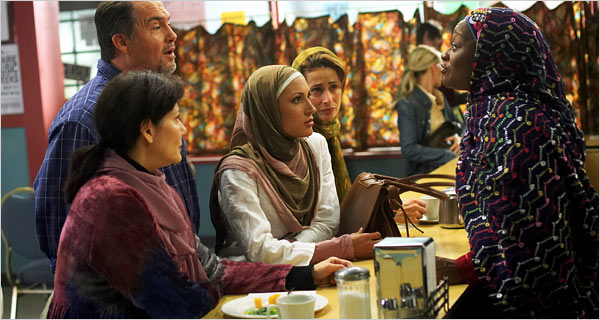
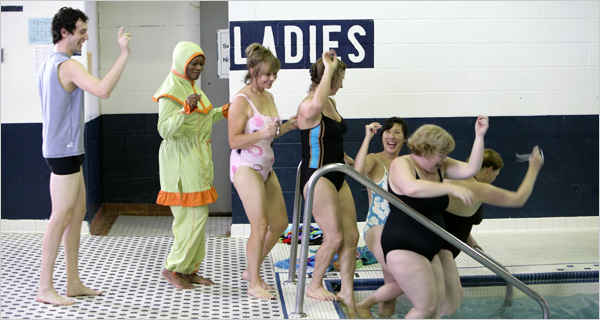
'Little Mosque on the Prairie' = big laughs?
TORONTO, Ontario - "Little Mosque on the Prairie," a Canadian sitcom that debuts Tuesday, January 9, depicts immigrant Muslims bumping up against white locals in rural Saskatchewan. Zarqa Nawaz, creator and writer of the groundbreaking show, insists she's an equal-opportunity satirist taking dead-aim at both Muslim and Canadian stereotypes in a post-September 11 world. "I expect both groups will be wondering if the other finds the showexternal link funny," says Nawaz. There are predictable jokes about Muslim beliefs clashing with Canadian traditions. In one scene, a father wearing a kufi, or a knitted cap worn by devout Muslims, protests that his Canadian-born daughter wearing a revealing tank top looks "like a Protestant."
"Don't you mean prostitute?" the daughter asks. "No, I meant a Protestant," the father replies. In another scene, a young man of Middle Eastern origins with a Canadian accent is heard in an airport check-in line telling his mother via cell phone that his father shouldn't think his choosing to stop being a Toronto lawyer to become an imam in Saskatchewan amounts to career "suicide." "This is Allah's plan for me," the young man says in passing, before an arresting cop appears suddenly and tells the surprised lawyer that he won't be making that appointment in Paradise. Nawaz, a British-born Muslim and mother of four who settled on the Prairies with her family a decade ago, downplays the idea that the homegrown comedy may spark widespread controversy. She insists her comedy springs from a relatively uneventful life in multicultural North America, unlike Europe, for example, where relations between Muslims and the wider Christian community are often a powder keg. "North America should be the first place where a comedy like this would come about, where Muslims can be comfortable in their own skin and questions of Canadian identity can produce a sitcom," she says. To ensure it doesn't cause unforeseen offense with "Little Mosque on the Prairie," the government-owned Canadian Broadcasting Corp. (CBC) has hired an independent Muslim-Canadian consultant to comb through the sitcom's creative elements and suggest possible alterations. Kirstine Layfield, CBC executive director of network programming, says recent preview screenings with select Muslim audiences elicited encouraging results -- laughter. "Just doing the series is a risk in itself, but one the public broadcaster should take on if we're to help communicate authenticity of living in Canada," Layfield adds. Mary Darling, one of three executive producers shopping the Canadian comedy stateside, says a U.S. airing may help break down barriers between faith communities. "It won't do any harm, and maybe it can do some good," she says.
Little Mosque On The Prairie
Fatima and Rayyan are headed to aquafit when they notice a man wearing a tiny black Speedo standing on the pool deck. They scramble to cover their hair with towels before approaching Johnny, who they discover is their instructor. "There's been a mistake. We can't take this class," says Rayyan. "Oh, have you never met a friend of Dorothy?" says Johnny. "Friend of Dorothy?" whispers Fatima. "It means he's gay," says Rayyan, picking up on the Judy Garland reference. She turns to Johnny. "You don't understand. We're Muslims. Men can't see us in bathing suits. They're too revealing." This prompts another crack from the flamboyant and cheeky swim coach: "Not revealing anything I'm interested in." The scene -- filmed last week at a public pool in Etobicoke, Ont. -- is part of the CBC's newest half-hour comedy, Little Mosque on the Prairie. The first eight episodes, originally slated for the fall of 2007, were rushed into production and will now debut on Jan. 9 at 8:30 p.m. The show, which is shot mainly in Regina, is set in the fictitious Prairie town of Mercy (pop. 10,000) and focuses on a group of Muslims trying to assimilate into a small Canadian community. "We try to find the hilarity in everyday scenarios," says Zarqa Nawaz, the show's creator. "Muslim women cover their hair because they're worried men will be attracted to it. But what if the guy is gay and isn't attracted to it? Does that count?" Some of the other topics include how Muslims in Canada deal with wearing face veils and with Halloween. Nawaz is a big fan of Everybody Loves Raymond and her show's humour -- including cheesy one-liners like "It's a good hijab if you can get it" -- is similar family-friendly fare. "We don't want to be political," says Nawaz, 39. "We just want to be funny." Of course, making a show about Muslims post 9/11 is inherently political -- even if it's on the CBC, and not, say, HBO. Nawaz says she watched Little House on the Prairie as a kid, but that her show's title is just a cute play on words -- not an homage to Michael Landon's classic series. Born in Liverpool, England, Nawaz grew up in Toronto (where she switched career plans in the early '90s from medicine to journalism) and moved to Regina after getting married -- she and her husband, a psychiatrist, have four children. She now runs FUNdamentalist Films, a production company aimed at "putting the fun back into fundamentalism." Her short films, while all comedic, have been more closely tied to current events. Me and the Mosque was about gender segregation in Canada's mosques. BBQ Muslims focused on two brothers considered terrorists after their backyard BBQ blew up. And Death Threat was about a writer who tries to get a fatwa to scare up publicity for her new book. "My parents don't quite get my comedies," says Nawaz. "They wonder if I'm making fun of people like them. I think it's a generational thing." Little Mosque is "more Northern Exposure than Corner Gas," she says. "The Muslim community is dying for a portrayal of Muslims that is more dynamic and more nuanced than the traditional terrorist villain." Aside from trying to be as "authentic" as possible, the biggest challenge facing Little Mosque is attracting non-Muslim viewers -- vital to the long-term survival of the show -- away from U.S. programs with far bigger budgets and production values. To make the show accessible, the cast includes several non-Muslim characters and the writing staff (all non-Muslims, aside from Nawaz) have built explanations into the scripts for some of the terms. "We do have the advantage," says Nawaz, "of making comedy with material nobody has ever dealt with." As a mosque-going Muslim, Nawaz can afford to take greater comedic liberties with the material than a non-Muslim. And though she draws from personal experiences ("People back home," she laughs, "are more careful around me now"), she remains very sensitive to honouring the faith. "I know what I'd be offended by," she says. "This is an equal opportunity show. Both Muslims and non-Muslims will watch and ask, 'are they making fun of me?' I don't think either group can claim we're just picking on them." Still, she anticipates some backlash. "A segment of the Muslim community will have wanted every Muslim to be a very good Muslim, for there to be no conflict and for everyone to follow Islam to the rule," says Nawaz. "But you can't make comedy without conflict."
‘Little Mosque’ Defuses Hate With Humor
TORONTO, Jan. 15 — When it comes to producing a funny television show or movie in Canada, producers here have a reliable stable of topics: French-English relations, urban-rural dynamics and anything that involves a bumbling politician or the United States. But Islam — something of a third rail of comedy throughout the Western world — did not make the list, which is one reason the Canadian Broadcasting Corporation’s new situation comedy, “Little Mosque on the Prairie,” is attracting such attention here. “It is a risk doing a sitcom about what can be considered a very touchy subject,” said Kirstine Layfield, executive director of network programming at CBC. But last Tuesday’s series premiere attracted 2.09 million viewers, impressive in a country where an audience of one million is a runaway hit. The CBC had not had a show draw that size audience in a decade, according to the network. The show follows a small group of Muslims in, of all places, a prairie town in Saskatchewan where, in the first episode, the group was trying to establish a mosque in the parish hall of a church. A passer-by, seeing the group praying, rushes to call a “terrorist hot line” to report Muslims praying “just like on CNN,” which touches off a local firestorm. Hoping to avoid making a stir in the town, the group hires a Canadian-born imam from Toronto who quits his father’s law firm to take the job — career suicide, his father thinks. On the way, he is detained in the airport after being overheard on his cellphone saying, “If Dad thinks that’s suicide, so be it,” adding, “This is Allah’s plan for me.” Later, a leader of the Muslim group is seen defending to a local person the plan to turn the parish hall into a mosque. “It’s a pilot project,” he says, leading the man to exclaim wide-eyed, “You’re training pilots?!” A bit hokey, perhaps. But light-hearted moments like these between Muslims and non-Muslims have been few and far between in Canada of late. Last year, 13 Muslim men and five youths were arrested in the Toronto area in connection with a suspected plot to attack several targets in southern Ontario. Their case continues to wind through the courts. In September, an inquiry cleared a Canadian citizen, Maher Arar, of terrorism accusations — for which the United States deported him to Syria, where he was tortured — based on faulty intelligence from Canadian authorities. The show’s creator, Zarqa Nawaz, said that she was not trying to bridge all of the cultural gaps, but that she hoped the program could elicit laughs on all sides and perhaps foster a better understanding between Muslims and non-Muslims. “I want the broader society to look at us as normal, with the same issues and concerns as anyone else,” said Ms. Nawaz, who based the series loosely on her own experiences as a Muslim woman who moved from Toronto to the prairie. “We’re just as much a part of the Canadian fabric as anyone else.” The CBC has committed to eight episodes of the program, and is negotiating with the show’s producers for 13 more in the spring. Despite the initial success, the network is proceeding with caution, having hired a consultant to flag anything in the scripts that could offend audiences. The show has generally been well received by Muslim leaders, who welcome the light touch it brings to issues that are normally debated in numbing seriousness. “Muslims are a bit late in laughing at themselves, but we have to use humor to remedy these divisions, just like any community,” said Mohamed Elmasry, an imam and president of the Canadian Islamic Congress. The show has been criticized for treating too lightly the threat posed by radical Islam and the imams who preach it. The newly hired imam in “Little Mosque on the Prairie,” Amaar Rashid, is clean-shaven, wears tight jeans and has the “ravishing looks of a soap-opera star,” as the columnist Margaret Wente wrote in the Toronto daily newspaper The Globe and Mail. “If there’s an imam on Earth who resembles this one, I will convert to Islam, don the veil and catch the next plane to Mecca,” she added. But what some see as a weakness, others see as a strength. Syed Asad Dean, chairman of the Meadowvale Islamic Center in Mississauga, a western suburb of Toronto, said portraying Muslims as moderate members of the mainstream could have a beneficial effect on young Muslims. “More extreme Muslims are telling our youth that Canada is not interested in our community, so something like this works dead against that type of mentality,” he said. “The youth see it on television and say, hey, they recognize us and they actually made an investment to talk about us and our life in Canada.” The program’s producers have spoken with television executives in the United States, Dubai, Israel, England, Germany and France among others. The first and second episodes have been sent to networks and stations that have expressed an interest. In the United States, only cable stations have responded so far, but CBC officials say they are hoping to pitch the show to the larger networks.
|
|
||||||||||||||||||||||||||||||
|
Website Design + SEO by designSEO.ca ~ Owned + Edited by Suzanne MacNevin | |||||||||||||||||||||||||||||||
